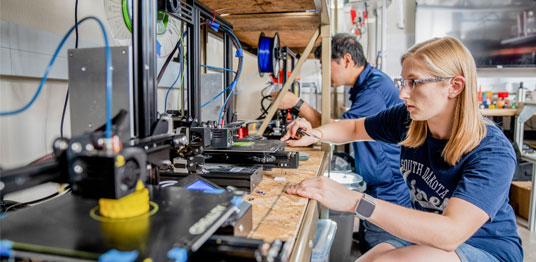
Research
Research initiatives in the Electrical Engineering and Computer Science department align with the university's research strengths. Undergraduate and graduate students have many opportunities to be involved in research, collaborate with department faculty,
and work in interdisciplinary teams with faculty and students from other departments.
Faculty Research Areas
Randy Hoover, PhD, Colorado State University
- Computer vision, machine learning, data analytics, dynamic systems and control, multilinear subspace learning, and graph-based forecasting.
Francis Akowah, PhD, Syracuse University
- Autonomous cyber-physical system security (attack detection and recovery), web security, mobile operating system security, application security, network security, privacy and anonymity, and machine learning security (adversarial attacks).
Mohammadreza Mehrabian, PhD, Arizona State University
- Cyber-physical systems (CPS), self-driving vehicles, autonomous intersections, runtime verification, temporal logic, embedded systems, software/hardware co-design, FPGA design, and the Internet of Things (IoT).
Lisa Rebenitsch, PhD, Michigan State University
- Cybersickness (visually induced motion sickness from a virtual environment), 3D Systems, virtual reality (VR), user interfaces, and non-parametric statistical models.
Kai Ren, PhD, The Ohio State University
- Antennas, microwave imaging, inverse problem, radar signal processing, and direction finding.
Long Zhao, PhD, The University of Texas at Arlington
- Renewable energy integration, rural power grid development, demand-side management, smart meter data analysis, and electric arc protection.
Sebin Gracy, PhD, University Grenoble-Alpes
- Stability analysis, control, and estimation of epidemiological processes; security of cyber-physical systems
Christer Karlsson, PhD, Colorado School of Mines
- Scientific visualization, high-performance computing (HPC), problem-solving environments, algorithms and software for multicore architectures, topology-aware MPI communications, and scalable checkpointing techniques.
Larry Pyeatt, PhD, Colorado State University
- Probabilistic artificial intelligence, statistical machine learning, neural networks, stochastic control theory, robotics, intelligent control, and computer vision.
Jeffrey McGough, PhD, University of Utah
- Mobile robotics path planning, localization and mapping, computer vision, evolutionary algorithms, particle and swarm methods, and biologically motivated algorithms.
Faculty Labs
Dr. Long Zhao, PhD, The University of Texas at Arlington
- The lab focuses on developing future power and energy systems. The research areas include renewable energy integration, rural power grid development, demand-side management, smart meter data analysis, and electric arc protection. The mission is to
develop a safe, smart, and sustainable (SSS) power and energy system for the future.
Dr. Randy Hoover, PhD, Colorado State University
- The lab conducts research at the forefront of machine learning for multi-modal spatiotemporal data. In particular, our research investigates advanced algorithms for: fusing multi-modal data along different spatiotemporal time-scales; dimensionality
reduction, and pattern classification of multi-modal data; understanding multi-modal relationships for graph representation learning; predicting future events through multi-modal forecasting methods; exploring data augmentation and graph expansion
from multi-modal graph embeddings.
Dr. Kai Ren, PhD, The Ohio State University
- The lab is equipped with 3D printers, software-defined radios (SDRs), vector network analyzers (VNAs, up to 67 GHz), and a walkable anechoic chamber with a dimension of W = 11’, H = 9’6”, and L = 21’.
- The research focuses on developing microwave sensing and direction-finding systems for civil and military applications, which can be applied to infrastructure inspections, rescue missions, electronic support, and electronic warfare.
Dr. Mohammadreza Mehrabian, PhD, Arizona State University
- The lab is at the forefront of investigating innovative approaches for designing, implementing, and verifying mobile robots and real-time/embedded systems.
- Developed systems/frameworks play pivotal roles in safety-critical applications, clean and smart energy systems, precision agriculture, safe mining operations, applications within the field of biomedical engineering, and ensuring security in cyber-physical
systems.
Virtual Reality Lab
Dr. Lisa Rebenitsch, PhD, Michigan State University
- The research extends to virtual reality, augmented reality, and user interfaces. Cybersickness is a particular focus of the lab but also includes XR usability and development.